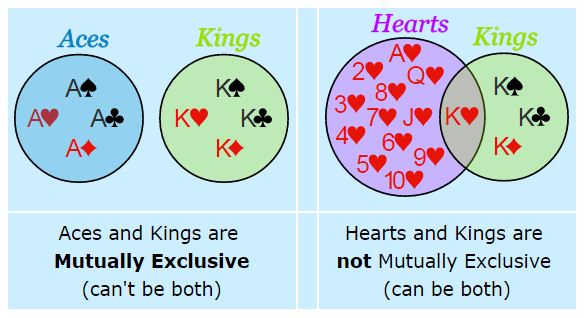Probability – Types of Events
Event: An event is a subset of a sample space.
- Simple event: An event containing only a single sample point is called an elementary or simple event.
- Compound events: Events obtained by combining together two or more elementary events are known as the compound events or decomposable events.
- Equally likely events: Events are equally likely if there is no reason for an event to occur in preference to any other event.
- Mutually exclusive or disjoint events: Events are said to be mutually exclusive or disjoint or incompatible if the occurrence of any one of them prevents the occurrence of all the others.
- Mutually non-exclusive events: The events which are not mutually exclusive are known as compatible events or mutually non exclusive events.

- Independent events: Events are said to be independent if the happening (or non-happening) of one event is not affected by the happening (or non-happening) of others.
- Dependent events: Two or more events are said to be dependent if the happening of one event affects (partially or totally) other event.
Mutually exclusive and exhaustive system of events:
Let S be the sample space associated with a random experiment. Let A1, A2, ……….. An be subsets of S such that
(i) Ai ∩ Aj = ϕ for i ≠ j and (ii) A1 ∪ A2 ∪ ….. ∪ An = S
Then the collection of events is said to form a mutually exclusive and exhaustive system of events.
If E1, E2, ……….. En are elementary events associated with a random experiment, then
(i) Ei ∩ Ej = ϕ for i ≠ j and (ii) E1 ∪ E2 ∪ ….. ∪ En = S
So, the collection of elementary events associated with a random experiment always form a system of mutually exclusive and exhaustive system of events.
In this system, P(A1 ∪ A2 ……… ∪ An) = P(A1) + P(A2) + …… + P(An) = 1